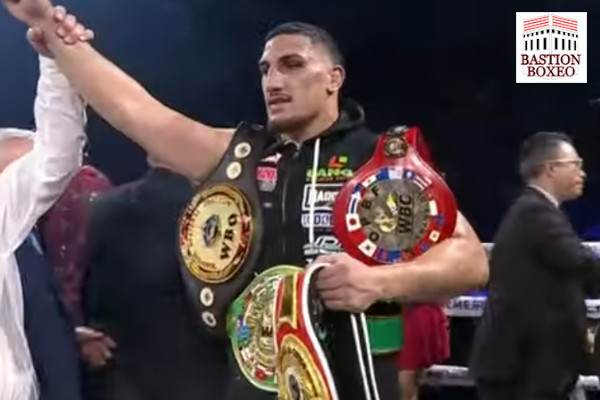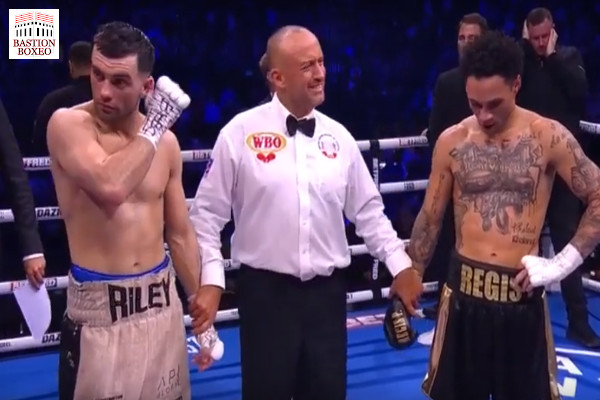El prospecto del peso pesado Justis Huni ganó dura batalla ante Kiki Leutele
Daniel Pi
@BastionBoxeo
Nissan Arena, Nathan, Brisbane. Australia. Peso pesado.
Sin duda, el australiano, bronce mundial amateur, Justis Huni 7(4KO)-0 se complicó mucho a sí mismo su combate contra el rocoso neozelandés Kiki Toa Leutele 8(7KO)-2-2, ante el que sostuvo un gran número de intercambios de golpes. Aun así, Huni logró una clara victoria por decisión unánime de los jueces y tarjetas de 97-93, 98-92 y 99-91.
¿Qué se debe hacer cuando se posee mucha habilidad y delante se tiene a un boxeador fuerte y pesado pero muy lento y con menos técnica? La respuesta a esta pregunta es evidente, y Huni perfectamente podría haberse mantenido en la distancia larga imponiendo su jab y escogidos directos para ir desgastando y frustrando a su oponente antes de buscar dañarlo en la segunda mitad. Con todo, Huni optó por hacer justo lo contrario de lo que debía: se paró a intercambiar cuerpo a cuerpo ante un rival que sólo tenía alguna opción de éxito en ese escenario táctico.
Así, aunque la velocidad y la destreza de Huni se dejaron notar a través de brillantes uppercuts y golpes consecutivos con una misma mano entre esquivas y diagonales, en el segundo round un gancho de izquierda de Leutele le dejó algo tocado. Sin embargo, ya fuese por tozudez, falta de inteligencia de ring o por no notarse ágil de piernas, Huni siguió guerreando cuerpo a cuerpo y ofreció un sinfín de intercambios, en los que por lo general se llevó la mejor parte pero sin poder evitar que en el cuarto asalto un gancho diestro le hiciese tocar la lona, aunque el árbitro no hizo cuenta.
Viendo que había logrado éxitos, Leutele se mantuvo aún más persistente de lo habitual, y hasta el final trató de presionar, de situarse en la distancia más corta e intentó imponer sus golpes de poder curvos. Pero Huni, aunque recurrió de forma creciente al clinch y ya no le quedaban muchas piernas para evitar intercambios, durante la segunda mitad de la pelea tuvo más momentos en los que caminó por el ring aprovechando su precisión y técnica y en los que encontró huecos para contragolpes muy certeros, de modo que certificó su victoria.
Al margen de que Leutele demostró, como ante Demsey McKean, que es un boxeador que no se debe infravalorar en absoluto y que es capaz de generar trabajo a rivales con aspiraciones internacionales, Huni creó lecturas dispares con su actuación. Por un lado, evidenció una capacidad para ofrecer esquivas de cintura que es poco común en los pesos pesados actuales, y también mostró destreza en los intercambios, valentía y otras cualidades. Sin embargo, en ningún momento estuvo cerca de dañar a su contrincante (expandiendo la opinión de que no tiene gran pegada) y tuvo una mala gestión táctica.
Por ello, aunque podría llegar a aparecer en próximas actualizaciones de la lista WBO, no se puede perder de vista que Huni sólo tiene siete combates profesionales y que de momento debería centrarse mucho más en desarrollarse y mejorar su rendimiento que en intentar escalar en las clasificaciones.

Heavyweight prospect Justis Huni won tough battle against Kiki Leutele
Daniel Pi
@BastionBoxing
Nissan Arena, Nathan, Brisbane. Australia. Heavyweight.
Undoubtedly, the Australian, world bronze medalist, Justis Huni 7(4KO)-0 made things unnecessarily difficult for himself exchanging a lot at close range against the New Zealander Kiki Toa Leutele 8(7KO)-2-2. Even so, Huni achieved a clear victory by unanimous decision and scorecards of 97-93, 98-92 and 99-91.
What should a boxer do when he has good skills and he is facing a strong and heavy opponent but who is very slow and has less technique? The answer to this question is self-evident, and Huni could very well have stayed at long range imposing his jab and chosen straight hands to wear down and frustrate his opponent before looking to hurt him in the second half of the fight. However, Huni did the exact opposite of what he should have done: he stopped his feet to exchange at short distance against an opponent who only had a chance of success in that tactical scenario.
Thus, although Huni’s speed and ability showed through brilliant uppercuts and consecutive punches with the same hand between dodges and uses of the angles, in the second round a left hook from Leutele hurt him somewhat. However, whether it was due to stubbornness, lack of ring intelligence or not feeling his legs agile enough, Huni continued to fight in a hard, physical battle and offered endless exchanges. The undefeated boxer usually had more success than his opponent, but in the fourth round a right hook made him touch the canvas, although the referee did not count.
Seeing that he has had his moments, Leutele was even more persistent than usual, and until the end he tried to put pressure, get into the shortest distance and sought to impose his power punches. But Huni, although he increasingly resorted to the clinch and did not have then much agility left to avoid exchanges, during the second half of the bout he tried to walk more around the ring taking advantage of his precision and technique and found breaches for very accurate counterpunches, so he secured a clear victory.
Apart from the fact that Leutele demonstrated, as against Demsey McKean, that he is a boxer who should not be underestimated at all and that he is capable of generating work for fighters with international aspirations, Huni created disparate analysis with his performance. On one hand, he displayed an ability to use waist dodges that is rare for today’s heavyweights, and he showed trading prowess, bravery and other qualities. However, on the other hand, he was not close to hurting his opponent (strengthening the opinion that he doesn’t have much punch) and he had poor tactical management.
For this reason, although he could appear in future updates of the WBO list, it should not be forgotten that Huni only has seven professional fights and that at the moment he should focus much more on developing and improving his boxing than on trying to climb the rankings.










